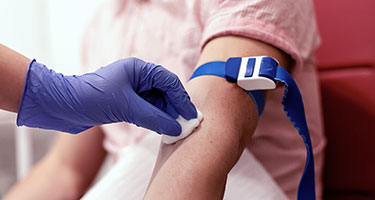Online Medical Assistant Training Program: Certified Clinical Medical Assistant + Phlebotomy Technician + EKG Technician – All in One
Our online medical assistant training will help you start your career as a Certified Medical Assistant by preparing you for full certification as a Clinical Medical Assistant + Phlebotomy Technician + EKG Technician.
Find out more about program discounts and monthly payment plan options by speaking to our Career Advisors today!
Online Medical Assistant Training Program: Certified Clinical Medical Assistant + Phlebotomy Technician + EKG Technician – All in One
Our online medical assistant training will help you start your career as a Certified Medical Assistant by preparing you for full certification as a Clinical Medical Assistant + Phlebotomy Technician + EKG Technician.
Find out more about program discounts and monthly payment plan options by speaking to our Career Advisors today!
Prepare for a New Career with Online Medical Assistant Training

Through CareerStep’s online Medical Assistant Program, you’ll take the first steps toward preparing for a rewarding career in healthcare! You’ll learn the foundational knowledge and skills that can help you become successful in the field, from anatomy and physiology to phlebotomy and EKG. You’ll also develop essential venipuncture skills and will receive a hands-on venipuncture kit as part of your training to help you better understand venipuncture processes and procedures.
The Online Medical Assistant Training Outline At-a-Glance
12 Months Full Access | CCMA, CPT, and CET Certification Prep

Medical Assistant Job Description
The healthcare industry moves fast, and medical assistants play a key role in keeping any facility running smoothly. They perform general patient care and handle routine administrative responsibilities—and their impact is undeniable. To be successful as a medical assistant, you need to be organized, adaptable, and empathic. If you’ve got the right training, and you’re also nurturing by nature, then this might be the path you should follow.
Medical Assistant Program Details
Our comprehensive curriculum covers essential skills that can help you prepare to be successful on the job from day one. You’ll learn about anatomy and physiology, venipuncture, electronic medical records, patient care, and more – all on your schedule.

3 Reasons to Complete Your Medical Assistant Training With CareerStep
Train your way
You’re in control here — move at your own pace, from your own home, on your own time. We won’t hold you to strict deadlines and rigid schedules.
Get certified
Our career training provides the knowledge and certification prep materials you need to sit for the CCMA, CPT, and CET, certification exams.
Learn skills that matter
In addition to the skills you’ll learn to become a Certified Medical Assistant, this program provides phlebotomy and EKG training that will set you apart from others seeking employment as a clinical medical assistant.
Ready to Dive In?
Interested in enrolling in a CareerStep program? Fill out the form below and our team will reach out to you with information about our partner schools in your area.
"*" indicates required fields
What You’ll Learn
Discover what it takes to get certification-ready with our online medical assistant program, and start looking for work sooner—with total confidence.

Body Basics
Get familiar with essential anatomy, foundational healthcare science, and medical terminology.

Patient Care
Learn how to obtain vital signs, take measurements, administer medications, and provide wound care.

Medical Procedures
See how to perform phlebotomy and EKG monitoring, label and process specimens, and assist physicians with procedures.

Office Administration
Understand medical-record management, insurance reimbursements, and how to successfully run patient waiting rooms.
Medical Assistant Certifications
CareerStep’s online Medical Assistant training covers the knowledge and skills you need to successfully sit for industry-recognized certification. We want to support our learners in securing the certification that fits based on your career goals and current job requirements. Your training includes up to three different exam vouchers for the certifications listed below, as well as a certification prep package, relevant to your training—a significant value add of several hundred dollars.
Certified Clinical Medical Assistant (CCMA)
Prove your competence in patient care and as a critical member of a healthcare team with the CCMA from the National Healthcareer Association.
Certified Phlebotomy Technician (CPT)
Demonstrate your capability to do intravenous blood draws with the CPT from the National Healthcareer Association.
Certified EKG Technician (CET)
Prove your proficiency with EKGs, stress tests, and Holter monitoring with the CET from the National Healthcareer Association.
Online Medical Assistant Program FAQs
Do I need clinical hours to complete my training?
Yes, clinical hours are an essential component of your training—particularly as you work towards certification and potential employment. They give you a chance to test your current skill level and put all your new knowledge to work in real-world settings.
CareerStep does not guarantee externships. A learner’s placement in and completion of an externship is solely the learner’s responsibility and may be subject to additional requirements, such as a background check and successful completion of a CareerStep course. This is particularly important for learners seeking to complete their externship in Alabama, District of Columbia, Indiana, Louisiana, Minnesota, Nebraska, Nevada, Pennsylvania, Tennessee, Texas, Washington, and Wyoming. Please note that CareerStep will not sign agreements with sites in the above-referenced states or provide evidence of insurance to those sites.
What will I do as a medical assistant?
A lot. You’ll support doctors, nurses, and other health professionals in medical settings, performing both clinical and administrative tasks. In other words, you’ll play a vital role in keeping healthcare facilities running smoothly. You’ll be hands-on with everything from wound care, phlebotomy, and EKGs to greeting and scheduling patients, managing medical records, and processing health insurance payments.
How much do medical assistants make?
Certified medical assistant salaries vary by employer, location, and experience, but according to the Bureau of Labor Statistics, on average medical assistants earn $44,200 per year. The bottom and top ten percent earn nearly $35,020 to more than $57,830 respectively.*
Do I have to be certified to work?
Yes and no. While California, Connecticut, Montana, New Jersey, and Washington have certification requirements, most states don’t require medical assistant certification. However, the U.S. Bureau of Labor Statistics reports that employers prefer to hire certified medical assistants.* Being certified as a medical assistant as well as a Phlebotomy Technician and EKG Technician gives you a competitive advantage and maximizes your earning potential.
This program prepares you for the following certifications:
- Certified Clinical Medical Assistant (CCMA)
- Certified Phlebotomy Technician (CPT)‡
- Certified EKG Technician (CET)‡
‡ Requires some additional hands-on work: 30 venipunctures + 10 capillary sticks for CPT; 10 EKGs on “real people” for CET.
Get Trained Today.
This program includes comprehensive training, career services, and coaching, along with certification prep materials and exam fees.
$3,799 for full program access
$3,799.00 for eligible MyCAA and ACA learners
Or call now: 800-411-7073 >>
*Bureau of Labor Statistics, U.S. Department of Labor. “Medical Assistants.” Occupational Outlook Handbook. Accessed April 22, 2025.
Statements found in the United States Department of Labor Occupational Outlook Handbook are not a guarantee of any post-graduation salary, in part because the data used to create the Occupational Outlook Handbook includes workers from differing educational backgrounds, levels of experience, and geographic areas of the country.
